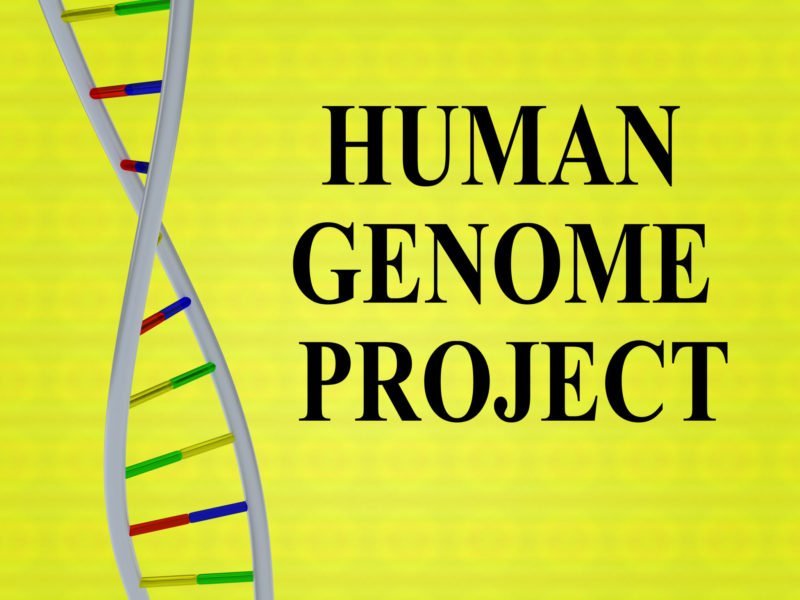What is Genetic Testing?
Genetic testing is a test that identifies changes or mutations in our body’s DNA that can lead to genetic diseases. The interpretation of these tests can shed light on a patients health and lifestyle. There are a multitude of reasons for a person to explore genetic testing and many different types of tests.
DNA and Genes
Deoxyribonucleic acid or DNA is the genetic code for our bodies. It determines the proteins we produce. DNA has two strands that spiral together to form a double helix structure. These strands consist of 4 genetic bases: adenine, cytosine, guanine, and thymine. One gene might be thousands of base pairs long. These bases are present in 3 letter sequences that code for an amino acid (protein building blocks). For example, CCU codes for proline and GCU codes for alanine (1).

Genes are referred to as units of heredity in our body. Most genes hold the instruction manual for protein production in our body. Proteins are responsible for the way our body works. They are responsible for many traits such as blood type and eye color. The cells in our body contain 50% of genes from our mother and 50% from our father. Our DNA is stored in the form of proteins called chromosomes. Chromosomes are the structure of proteins in our cells that carry the genetic blueprint (1). They consist of protein and one unit of DNA. As humans, we have 46 chromosomes in our cells, a set of 23 from our mother and a set of 23 from our father (1).
What is Gene Testing?
Gene tests are medical tests performed on a sample of blood or other tissue. These samples are sent to labs where geneticists identify variations in genes, proteins, or chromosomes (2). Mutations in chromosomes arise as natural errors in DNA replication at conception or exposure to the environment as we age. Mutations are changes in our DNA sequence that may affect the proteins we make and therefore affect our gene function.
The more healthcare professionals learn about your genes through screening tests, the better they understand your health conditions. Knowing one’s family history can be a vital healthcare precaution. People can’t control whether they’re born with these mutations or not, but sometimes they can control their environment. Environmental exposure refers to external factors in our lives such as sunlight, radiation, diet, and smoking. Certain diseases can be prevented by avoiding external factors. For example, Phenylketonuria (PKU) is a disease a person is born with where the body accumulates an overabundance of the protein phenylalanine. This is because of a defect in the gene that creates the enzyme needed to degrade phenylalanine (4). PKU can lead to serious health problems unless the proper diet is followed. By avoiding foods containing phenylalanine, people with PKU can live a normal life.
Why is Gene Testing Performed?
Genetic tests are done for a number of different reasons. Parents might submit to gene testing for their unborn child in order to detect the possibility of disease or two people wishing to conceive a child may undergo carrier testing to determine whether they may pass a gene for a disease to their children.
Genetic tests can also be used as a preventative measure. If you know there are certain diseases that you may develop in the future, it could make treatment easier (3). A healthcare professional can sometimes prescribe a tailored medication if they have an idea of what’s in your cells. Gene testing can help us recognize hereditary cancer before symptoms arise. Breast cancer is a good example. Women with family members who have suffered from breast cancer should undergo gene testing to see if they have a positive result for the BRCA1 or BRCA2 gene. The National Cancer Institute reports these two genes as the most common ones linked to breast cancer (5).

Different Methods of Genetic Testing
Different types of genetic testing include newborn screening, diagnostic testing, carrier testing, prenatal testing, predictive testing, and forensic testing (2).
- Newborn testing is great for detecting genetic diseases early in life which can optimize treatment.
- Diagnostic tests point out a specific genetic condition and can be done at any point in a person’s life. They are often performed after symptoms arise and healthcare professionals are seeking answers.
- Carrier testing is used when two people are suspected carriers of a genetic disease. Carriers are people who possess a recessive allele for a mutation but don’t show the disease. When two carriers of a mutation have a child there is a 25% chance their child will display the genetic mutation (2). It is important for these people to consider their plan of action if they receive a positive result.
- Prenatal screening is genetic testing for pregnancy. It detects mutations in a fetus’s chromosomes. Genetic testing when pregnant can’t detect every possible genetic disorder but it can detect some serious genetic diseases such as cystic fibrosis or sickle cell disease.
- Predictive testing is a rather new form of genetic testing where an individual without symptoms is tested in order to determine their risk for certain diseases or cancer risk. These tests aim to reduce the severity and mortality rate of genetic diseases (10).
- Forensic screening is the only type of testing not used for identifying genetic mutations. It is used for legal purposes such as identifying a suspect in a criminal case. Forensic testing can also establish biological relationships between human beings (2).
At Home Gene Testing
In today’s world, we see constant advertising via the internet or television for at-home genetic tests. Before choosing which test to take, it is important to do your research. Each company looks at different variants of a gene, so you might receive different results from different companies. For these at home tests, a person sends a sample of their DNA (saliva, cheek swab, etc.) to a company and they receive results in the form of a report.
A few of the popular kits are 23andMe, AncestryDNA, and MyHeritage. The process for each of these tests is pretty similar. You order the kit online, follow the instructions, and in about 6 weeks you receive results. The price for each is slightly different. MyHeritage offers the most affordable one at $59 dollars. AncestryDNA charges $99 dollars when you order the kit online. Perhaps the most impressive is 23andMe. They offer ancestry testing for $99 dollars and ancestry testing plus genetic health risk reports for $199.
People considering an at-home genetic test should talk to their healthcare professional first. Your doctor might be able to recommend the best test for you and help interpret your results (9).
Clinical Gene Test Cost
Clinical gene testing rates may be as low as $100 dollars or as high as $2,000 (2). Obviously, different methods have different price ranges. Newborn testing costs depend on the state in which they are conducted, but most states charge somewhere between $15 and $60 dollars per infant (2). If they are ordered by a doctor, genetic tests are usually covered by health insurance. Before agreeing to a genetic test and allowing health insurance to cover it you might want to research your state’s privacy protection laws regarding DNA testing.
Pros of Clinical Gene Testing
Let’s discuss some positives of clinical gene testing. A genetic counselor can help to better inform people considering the positives and negatives of screening. Gene testing allows us to make educated decisions about the future of our health care routine. It may also halt the need for further checkups and testing if our healthcare provider is able to rule out a genetic condition (2). Genetic tests are proven helpful when a couple is making the decision on whether or not to conceive. Subsequently, prenatal testing can pinpoint genetic disorders early in life and make the earliest of treatments feasible (2).
Cons/Limitations of Genetic Testing
When performing genetic testing on a fetus, there is a very slight risk of miscarriage due to the fact that this type of testing requires obtaining amniotic fluid or tissue surrounding the fetus.
For adult gene testing, however, there are hardly any risks associated with tests requiring a blood sample or swab of cheek cells. The negatives of gene testing are not only physical. There are emotional and social risks involved. Patients might develop anxiety over their test results (2). In addition, for many genetic disorders, the treatment is limited. Genetic testing when pregnant can create distress in parents who know their child will have birth defects. Before committing to screening tests, it is recommended that patients seek genetic counseling (2).
The accuracy of genetic tests has expanded rapidly over the past 2 decades thanks to the Human Genome Project. This was an international research program with the goal of mapping out and understanding all of the genes human beings possess (7). Researchers gave us access to a vast amount of health information by further decoding the human genome. For example, we now know the order of all our DNA’s bases, can map out our major genes on chromosomes, and can create linkage maps. Linkage maps track inheritable genes over generations. These inheritable genes might be ones for certain diseases or cancer risk. The National Human Genome Research Institute revealed there are around 20,500 human genes.

Now that our knowledge of the human genome is so extensive, there are ethical concerns such as genetic discrimination. Genetic discrimination is the misuse of genetic information by employers, insurance companies, and even pharmaceutical companies. In an attempt to minimize discrimination, the United States Congress passed The Genetic Information Nondiscrimination Act of 2008 (6).
The Future
The Genetic Testing Registry serves as a location for voluntary submission of genetic test information (8). The goal of this registry is to improve the knowledge surrounding the genetics of health and disease. It is for healthcare professionals and researchers to navigate genetic tests (8). By using the registry, the individuals can find tests for a specific condition, genomic tests, and laboratories. The average consumer should ask their healthcare professional or genetic counselor for advice on genetic tests.
Citations
- https://publications.nigms.nih.gov/thenewgenetics/chapter1.html
- https://ghr.nlm.nih.gov/primer/testing/genetictesting
- https://vsearch.nlm.nih.gov/vivisimo/cgi-bin/query-meta?v%3Aproject=medlineplus&v%3Asources=medlineplus-bundle&query=genetic+testing
- https://www.cdc.gov/genomics/hugenet/publications/genetest.htm
- https://www.cancer.gov/about-cancer/causes-prevention/genetics/brca-fact-sheet#q6
- https://www.eeoc.gov/laws/statutes/gina.cfm
- https://www.genome.gov/12011238/an-overview-of-the-human-genome-project/
- https://www.ncbi.nlm.nih.gov/gtr/
- https://www.consumer.ftc.gov/articles/0166-direct-consumer-genetic-tests#information
- https://www.ncbi.nlm.nih.gov/pmc/articles/PMC1120190/


